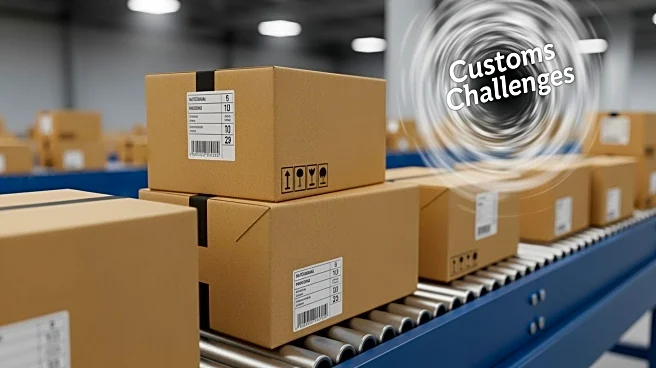What's Happening?
UPS is encountering difficulties with international shipments due to recent changes in U.S. customs regulations, which have been influenced by the Trump administration's tariff policies. These tariffs,
affecting products like steel, aluminum, and wood, require more detailed customs information for packages entering the U.S. As a result, some packages are being destroyed if they cannot be cleared due to missing or incomplete information. UPS attempts to obtain the necessary information from shippers and recipients, but if unsuccessful, the packages are considered abandoned and disposed of in compliance with customs regulations. Other shipping companies like FedEx and DHL Express are also facing similar challenges, although they have different procedures for handling such situations.
Why It's Important?
The disposal of packages due to customs issues highlights the impact of tariff policies on international trade and consumer satisfaction. Businesses and consumers are experiencing delays and potential losses, affecting their operations and personal plans. The situation underscores the complexity and cost implications of navigating international shipping under stringent customs requirements. Companies may reconsider their shipping strategies or even withdraw from the U.S. market, as seen with China's Gstar Electronics Appliance Co., which has shifted focus away from the U.S. due to tariff challenges. This could lead to reduced availability of foreign goods and increased costs for U.S. consumers.
What's Next?
Shipping companies are likely to continue adapting their processes to comply with evolving customs regulations. They may invest in better communication systems to ensure necessary information is obtained promptly, reducing the risk of package disposal. Businesses might seek alternative markets or adjust their pricing strategies to accommodate increased tariffs. Consumers may need to be more vigilant about providing accurate shipping information and be prepared for potential delays or additional costs. The ongoing tariff situation could prompt further discussions on trade policies and their impact on global commerce.
Beyond the Headlines
The ethical implications of disposing of consumer goods due to regulatory challenges raise questions about waste management and environmental impact. The practice of destroying packages could contribute to increased waste, prompting calls for more sustainable solutions in the shipping industry. Additionally, the situation may lead to legal challenges from consumers seeking compensation for lost goods, influencing future regulatory and business practices.








